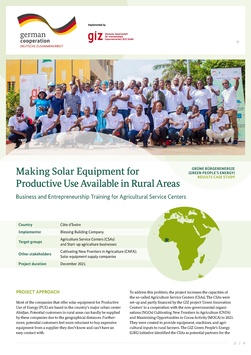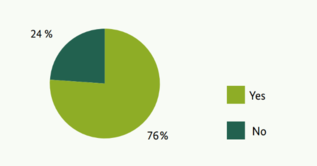Making Solar Equipment for Productive Use Available in Rural Areas in Ivory Coast
Making Solar Equipment for Productive Use Available in Rural Areas in Ivory Coast
Project Approach
Most of the companies that offer solar equipment for Productive Use of Energy (PUE) are based in the country’s major urban center Abidjan. Potential customers in rural areas can hardly be supplied by these companies due to the geographical distances. Furthermore, potential customers feel more reluctant to buy expensive equipment from a supplier they do not know and cannot have an easy contact with.To address this problem, the project increases the capacities of the so-called Agriculture Service Centers (CSAs). The CSAs were set-up and partly financed by the GIZ project ’Green Innovation Centers’ in a cooperation with the non-governmental organisations (NGOs) Cultivating New Frontiers in Agriculture (CNFA) and Maximizing Opportunities in Cocoa Activity (MOCA) in 2021. They were created to provide equipment, machines, and agricultural inputs to rural farmers. The GIZ Green People’s Energy (GBE) initiative identified the CSAs as potential partners for the distribution of Productive Use of Energy (PUE) equipment in rural areas. Therefore, the project wants to strenghten their capacities in handling solar equipment and creating potential business models for their sale to rural customers. The CSAs are to act as mediators in rural areas to facilitate sales, provide close aftersales service, and supply spare parts for various equipment.
Despite the CSAs’ willingness to sell PUE solar equipment, they struggle to build a profitable business with this activity. To address this problem, the GBE project implements an entrepreneurship training for the CSAs. This training is primarily targeted at managers and sales representatives of various CSAs and start-ups who are active in the agriculture sector and are interested in selling PUE solar equipment.
The training lasts four days, and covers various topics, including:
- Introduction to photovoltaics and entrepreneurship with a focus on the concept of photovoltaics, the characteristics of a good entrepreneur, and business management;
- Marketing and sales of PUE appliances, including identification of various rural repairers/installers, customer service, and partnerships with PUE equipment suppliers;
- Installations and utilisation of PUE appliances with a focus on the management of PUE devices, installation processes, usage modes of the different devices and a site visit to see a PUE application in practice.
Methodology of data collection
Data for this case study report was collected through a review of project documents, five qualitative interviews with GIZ representatives, a former CNFA employee in charge of CSAs, the President of the CSA network in Côte d’Ivoire (RECSACI), a trainer from Blessing Building Company, and the Business Manager of BAOBAB+ (a solar equipment supply enterprise) as well as a quantitative survey of the 25 training participants (of which 24 % are female) from the target group (20 members of CSAs and five startups selling agricultural equipment). The case study was conducted between January and May 2023.
Key findings
Project Achievements
The project has broadened the knowledge of the participants in many ways. This includes, on the one hand, the teaching of basic practical technical skills, which were promoted through demonstrations. On the other hand, business development capacities were strengthened, especially in the areas of marketing, sales, business strategy, and business reporting. Around three quarters of the training participants state in the survey that they apply their gained knowledge in their jobs, e.g. by advising customers on different types of solar equipment such as lamps, fans, and refrigerators (see figure 1).
Furthermore, the training has strengthened the exchange of professional experiences between different CSAs. Thanks to the project, in rural areas solar equipment is better accessible and CSAs’ have improved their knowledge about the technology.
Intermediate Impact
The survey among the training participants shows various intermediate effects (see figure 2). Almost all respondents report that they have improved their professional performance due to the training. 60% of the beneficiaries have taken on new professional tasks, and about half of the CSAs and start-up businesses report higher income as a result of the GBE project. The increase in income is explained in particular by better advice to customers and associated sales figures. One training participant mentioned, for instance, the acquisition of five customers interested in BAOBAB+’s solar panels and stoves. In addition, some CSAs and start-up companies have expanded their product range and now offer more PUE equipment (solar sprayers, solar seeders, etc.) in particular for the agricultural sector. Furthermore, some individual success stories can be observed. One CSA has expanded its workspace and increased the number of employees from one to two. Another training participant could use the training certificate for a successful job application.Challenges in Project Implementation
One difficulty is that building the CSA’s reputation as a trustworthy supplier of PUE equipment takes time. This is because potential customers have received poor quality from other suppliers in the past and are therefore suspicious. Another challenge is that many farmers and SMEs in the project region are lacking sufficient funds to acquire solar equipment.
On the supply side of PUE equipment, the offer has increased due to the strengthening of CSAs as suppliers. But CSAs still usually do not have trained staff to take care of maintenance and after-sale service. A four-day training can hardly build the required technical capacities, especially as the focus of the training is on commercial rather than technical skills. At the same time, for some participants, attending such a training causes the problem, that they are not able to run their business during the training days. In addition, some major manufacturers and suppliers distribute agricultural inputs and PUE equipment in the region where CSAs operate. These companies based in cities make roadshows, where they usually sell relatively cheap but also low-quality PUE equipment. Most of these companies do not take care of problems that arise after the purchase, especially since these companies do not have local branches in the rural regions. This can not only lead to a negative image for PUE equipment (see challenge above), but also pose a competitive challenge for the CSAs and small start-ups.
Lessons Learned
Technical knowledge is an important prerequisite for selling solar-powered equipment. However, transferring this knowledge through a training course lasting several days – which also goes beyond the technical aspects of the solar equipment – is only possible for very easy-to-use solar-powered appliances such as solar sprayers, solar seeders, etc.
In addition, integrating practical application examples into a training is a crucial success factor. It could be helpful if the test devices are available to the participants for some time after the training, so that they have further testing opportunities, if needed. Feedback from individual training participants also indicates that they would like, or in some cases even expect, further support from GIZ after the training. The project has tried to counteract such false expectations. Clear and transparent communication regarding the limits of support should take place in comparable projects.
Sustainability of the Intervention
In general, the statistics presented above show that the knowledge from the training is used for the business activities of the CSAs and start-ups. The immediate integration of the training content into everyday business life suggests that the training measure also has positive effects in the medium term. However, individual training participants also critically noted that there is no follow up after the training and thus the knowledge e.g. in the field of maintenance is limited. This could pose a risk, if costumers would request repairs for defective devices that go beyond the CSA’s level of knowledge. Continuous support for the CSAs therefore appears necessary. Thus, the GBE project has linked the CSAs to the Maximization of the Socio-economic Impacts of Rural Electrification in Côte d’Ivoire (MAX) Project of the French Development Agency (AFD). This project could carry out follow-up activities.
Conclusion and Outlook
The project approach builds on the structures previously created, and the needs of the CSAs were taken into account when designing the training. The majority of training participants state that the training is moderately or highly relevant to their work. However, 16 % of the respondents consider the training to be only slightly relevant, and 8 % even not relevant. This shows that the chosen training approach is suitable for most but not all trainees.
Positive effects of the training measure are recognisable, although the extent and sustainability of the impacts are limited due to the small scale of the training. Possible future projects should address the challenges identified, e.g. the lack of financial resources of CSAs to purchase solar equipment could be addressed by including a financing component. In addition, future training activities could further improve the technical capacities of the CSAs.






















